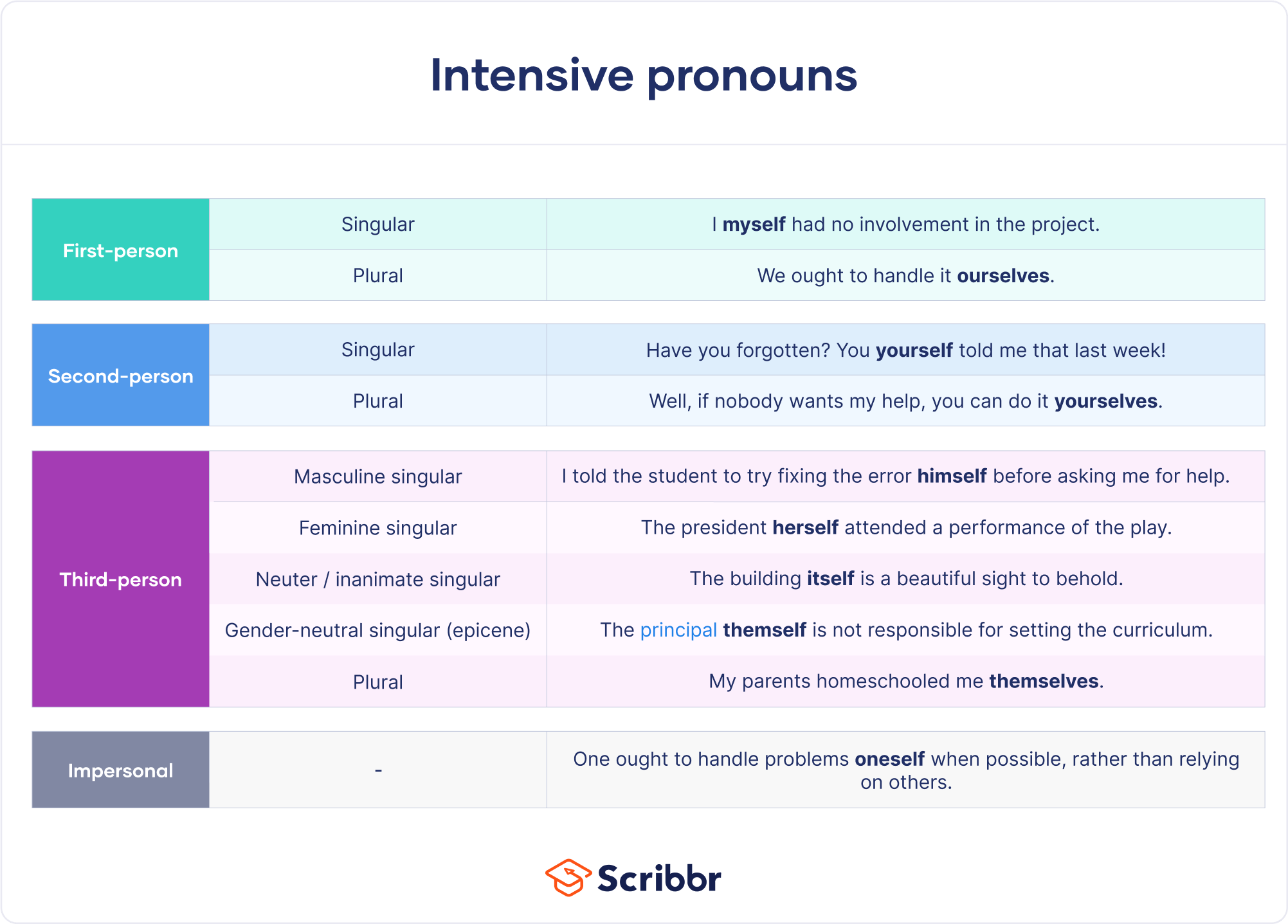Intensive Pronouns | Examples, Definition & List
An intensive pronoun (sometimes called an emphatic pronoun) is a word that’s used to place special emphasis on another noun or pronoun (e.g. “the man himself”). It can indicate something special or unexpected or distinguish the person or thing in question from others.
In English, intensive pronouns are identical to reflexive pronouns—both always end in -self or -selves—but their grammatical functions are different. There are intensive forms of all the personal pronouns and of the impersonal pronoun “one.”
How are intensive pronouns used in sentences?
An intensive pronoun always appears in combination with a noun or another pronoun; it can’t stand on its own as a subject or object.
- Myself have never been to Australia.
- I myself have never been to Australia.
- Why don’t you ask himself?
- Why don’t you ask the man himself?
The intensive pronoun most commonly appears directly after the antecedent (the noun or pronoun it refers to), but it can also appear later in the sentence. The kind of emphasis provided can vary based on the placement of the intensive pronoun.
You should do it yourself. [more emphasis on the fact the action will be performed alone]
The intensive pronoun occasionally appears before the antecedent, separated from it with a comma. The emphasis is similar to placing it directly after the antecedent. This is a less common word order and tends to read less smoothly than other options.
Intensive vs. reflexive pronouns
All the same words that function as intensive pronouns can also be used as reflexive pronouns. While the words are identical, their grammatical function in each case is different:
- An intensive pronoun is used in combination with a noun or pronoun, on which they place special emphasis. The sentence will still make sense (though the emphasis will change) if it is removed.
- A reflexive pronoun is used in place of an object pronoun when the subject and object are the same person or thing. It’s essential to the meaning of the sentence.
Give yourself a break. [“Give a break” isn’t a complete sentence.]
The robot can complete many tasks itself. [“The robot can complete many tasks” is a complete sentence.]
The investment pays for itself. [“The investment pays for” isn’t a complete sentence.]
Frequently asked questions
- What is an intensive pronoun?
-
An intensive pronoun is a word ending in -self or -selves that is used in combination with a noun or pronoun to place special emphasis on it.
For example, “myself” in the sentence “I did it myself” is an intensive pronoun used to emphasize the subject pronoun “I.”
The English intensive pronouns are myself, ourselves, yourself, yourselves, himself, herself, itself, themselves, and oneself. All of them can also be used as reflexive pronouns.
- What is the difference between reflexive and intensive pronouns?
-
Reflexive pronouns and intensive pronouns are identical in spelling and pronunciation: they’re the words ending in -self or -selves (e.g., “myself,” “themselves”). But they play different grammatical roles:
- Reflexive pronouns serve as the object of a transitive verb when the object is the same person or thing as the subject (e.g., “I believe in myself”).
- Intensive pronouns are used in combination with another noun or pronoun to place special emphasis on it (“I myself wrote the code”).
- Is “themself” a word?
-
Themself is a word that’s used as an alternative singular form of the reflexive pronoun or intensive pronoun themselves. It’s used in combination with the singular “they.”
But there’s still some debate about whether this usage should be considered standard. Merriam-Webster lists it as “nonstandard” but indicates that its use is increasing over time. APA Style regards it as an acceptable alternative to themselves but doesn’t require its use.
If you’re worried about correctness, our advice is to continue using themselves for both the singular and the plural sense for now.
Sources in this article
We strongly encourage students to use sources in their work. You can cite our article (APA Style) or take a deep dive into the articles below.
This Scribbr articleCaulfield, J. (2023, May 15). Intensive Pronouns | Examples, Definition & List. Scribbr. Retrieved November 28, 2023, from https://www.scribbr.com/nouns-and-pronouns/intensive-pronoun/
Aarts, B. (2011). Oxford modern English grammar. Oxford University Press.
Butterfield, J. (Ed.). (2015). Fowler’s dictionary of modern English usage (4th ed.). Oxford University Press.
Garner, B. A. (2016). Garner’s modern English usage (4th ed.). Oxford University Press.


